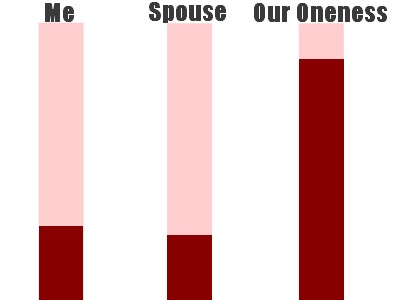What everyone else knows…Part 2
This is the second part to this post. The first is available here
If you have identified an issue in your spouse, or in your communication and mutual commitment, then if appropriate, you could discuss it, if your marriage and your communication are strong enough for that. Otherwise, you could just pray about it. The ideal situation is that you would both be open to getting feedback from one another about areas of growth. The Bible says in Proverbs that a wise man gladly receives instruction, if you instruct a wise man, he will be wiser still. (Obviously this applies to wise women as well!) Proverbs 9v9: “Give instruction to a wise man, and he will be still wiser, teach a just man and he will increase in learning.” However, the previous verse says (verse 8) “Do not correct a scoffer, lest he hate you”. Lack of maturity on the part of your spouse might cause them to get angry or resentful if you let them know about their failings. This is the big challenge if trying to present to your spouse negative opinions of their character traits – especially if you present yourself as being “whiter than white” in the current situation. And yet, this is human nature, isn’t it? It always seems to be easier to identify failings in the other party.
“But I’m not sure that I know how to identify the current problem…” I think that if we were to be truly honest with ourselves as individuals, we could correctly identify at least 70% of almost any problem about our marriages. While this is not everything, at least it is a start. If you would only work to rectify that 70% of the issue, then that will of itself have gone a long way to solving the whole issue. I think that, as with many things, it’s not what what we don’t know that is the problem, but rather the fact that we fail to do what we do know to do. And then there are those times when you know perfectly well that you are doing xyz, but you justify it to yourself, and your spouse, by pointing out to yourself, and to him, his supposedly greater failings. “Well he shouldn’t be doing ABC!”
So another way of putting all this is that you could think of the health of your marriage in terms of three vertical progress bars, represented by you, your spouse, and the success of your merging. If all three bars are at their full level, then this represents an excellent marriage. If there is a problem in your marriage, then it will be caused by at least one of the bars being at less than their full height, and your job will be to get those bars back to their full height.
Communication/Oneness bootcamp…
We need to work on spending time together, holding hands, communicating deeply, striving to become one entity

Prayer bootcamp: While our marriage is doing well, we each need to work on our character via intensifying our time in prayer and honest, earnest Bible study – perhaps we could do this together

He’s like, so amazing, and he’s like, so amazing and he’s like, so amazing!
Either I genuinely am *the* luckiest girl in the world, or….realistically speaking, we’re not actually married yet, are we?! (Or only very, very, very recently married!)

You don’t have to wait for problems to actually surface within your marriage. You could be actively monitoring the level of the three bars, and proactively working to keep them all at a high level. If you notice a dip in your communication or your commitment to one another, then you could try to find a way to resolve it. The advantage of this is that you don’t have to wait for issues to become conflicts (although admittedly conflicts often arise seemingly from out of the blue). Some marriages (many) however, somehow manage to grow stale and lifeless without any actual conflicts at all or arguments at all – perhaps both parties deliberately avoid confrontation and a cold civility creeps in. A slightly naughty question that I have often wondered: In these marriages, I think we can assume that they are no longer hugging, but are they still – you know…you know?! How does that work exactly? In a way, I’m not sure I want to know the answer to this question, although I suspect I already do know the answer. Do they still go through the other motions of celebrating their love which is now mostly dead, like sharing anniversary meals, exchanging Valentine’s Day greetings with sugar sweet messages to one another (and you know how cards say things like “you are the love of my life, my darling husband”)? I have been in enough perfunctory friendships and interactions in my life to know that the answer is probably “yes” to all of the above.
Either way, I think I would prefer all out war, and angry, raging arguments, as in that case it at least still represents communication…and passion. There is often a sincerity in anger that brings the truth to the surface about what is truly upsetting your spouse. “You never have time for me anymore! You are always writing your stupid blog posts – what about me?!!!” I think I would prefer arguments unless we have children, in which case I hope we would have the restraint to go and argue somewhere without them. That said, I am not planning or dreaming of having these kinds of interaction on a regular basis with my husband. Hollywood/movies sometimes glamourise these kinds of arguments especially in marriage. Sometimes these confrontations will happen, just like sometimes even a healthy body will succumb to a cold or an infection. However, I think on the whole I would prefer to be expressing and receiving sincere love and affection, and holding hands. (How do I so often end up writing about holding hands on this blog?!)
Anyway, to go back to the actual subject at hand – no pun intended! – perhaps this is what other people know, that inspires easy confidence about the idea of getting married. And the advantage of this is that it is a much simpler method to remember, than to try to keep in mind twenty different topics. While I am the one advocating some of these intricate theories, I am unashamedly the world’s greatest supporter of easy, one-step systems in *everything* in my life. If something seems too complex, or has too many convoluted steps then I know that I personally will not use it. So if my other ideas might just seem like too many things to remember, or to have to keep consulting (What was the web address of that blog again?!) will this idea be more straightforward, if trying to analyse issues in your marriage? Trusting that by God’s grace I will get married, I will probably be using this simple idea of monitoring these areas as an easy framework to think about my marriage possibly 80% of the time and consulting my other ideas and those of other people only around 20% of the time, if that.
Regarding this, I still think it is useful to take the time to evaluate the character of your spouse and get to know them before you actually do marry them, to make sure that they are growing! – and that their growth is in a direction that is compatible with who you are, and who you wish to be.
Bible Verses:
Matthew 5v16:
16 Let your light so shine before men, that they may see your good works and glorify your Father in heaven.
Teach a just man, and he will increase in learning.
———————————————————————–
PHOTO CREDITS
Music image from webdesign hot at http://www.webdesignhot.com
———————————————————————–
[Comment Details]





Leave a Reply